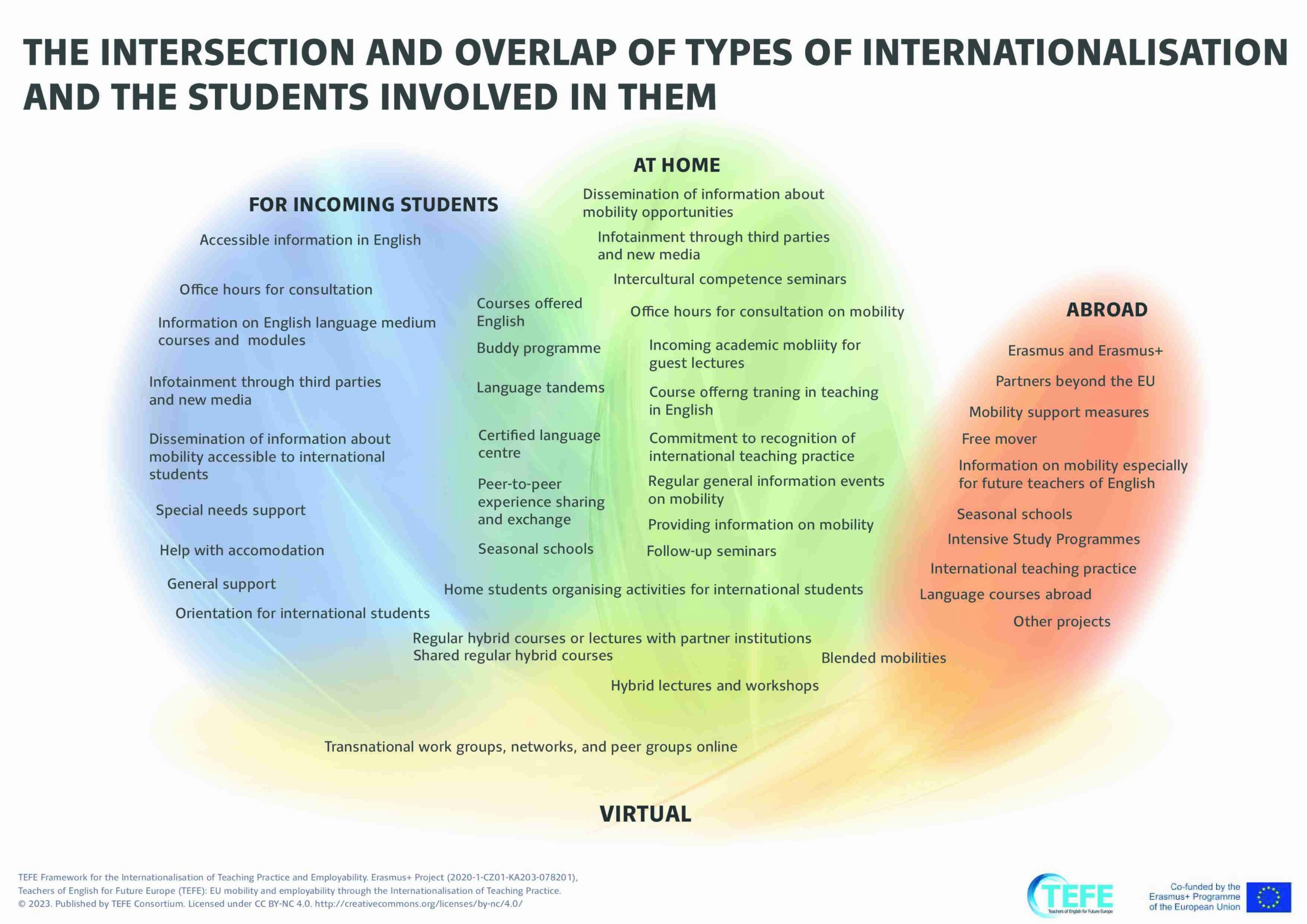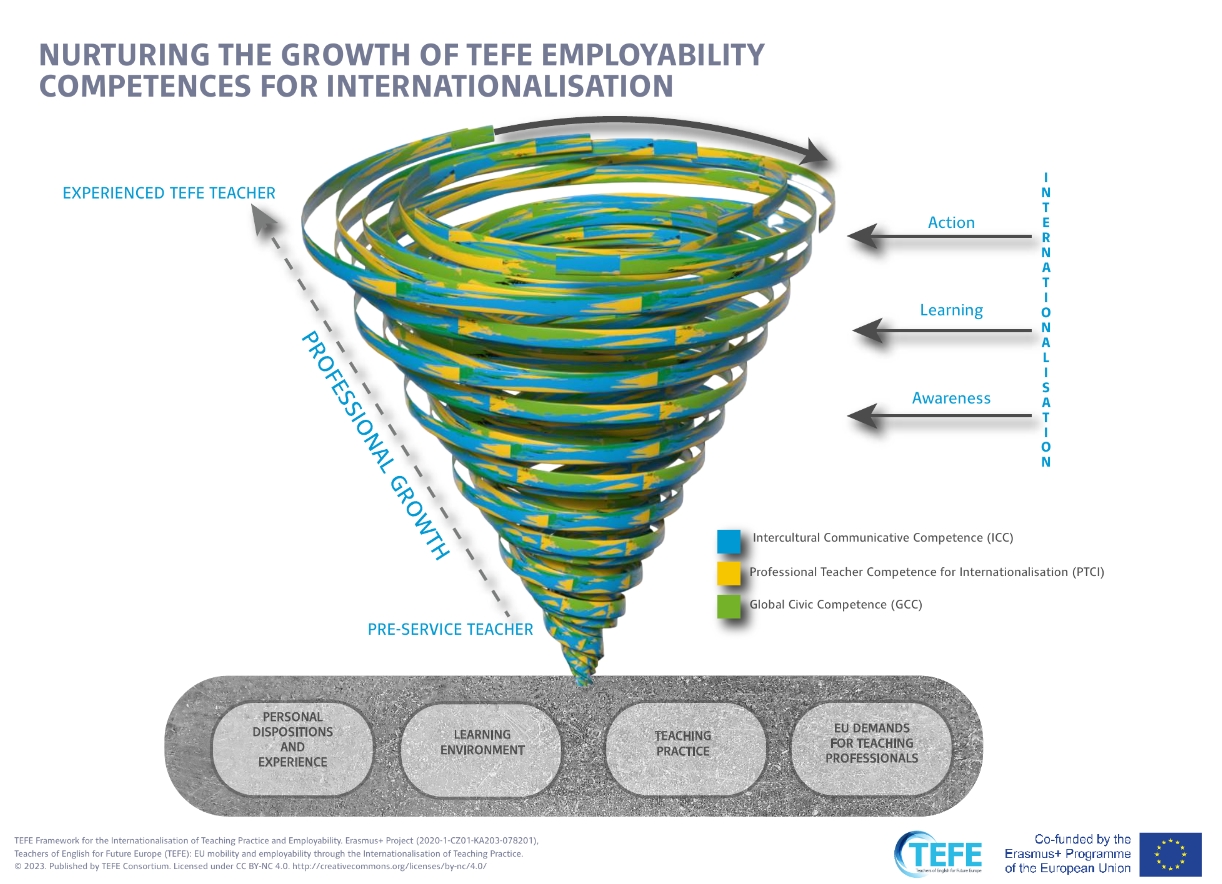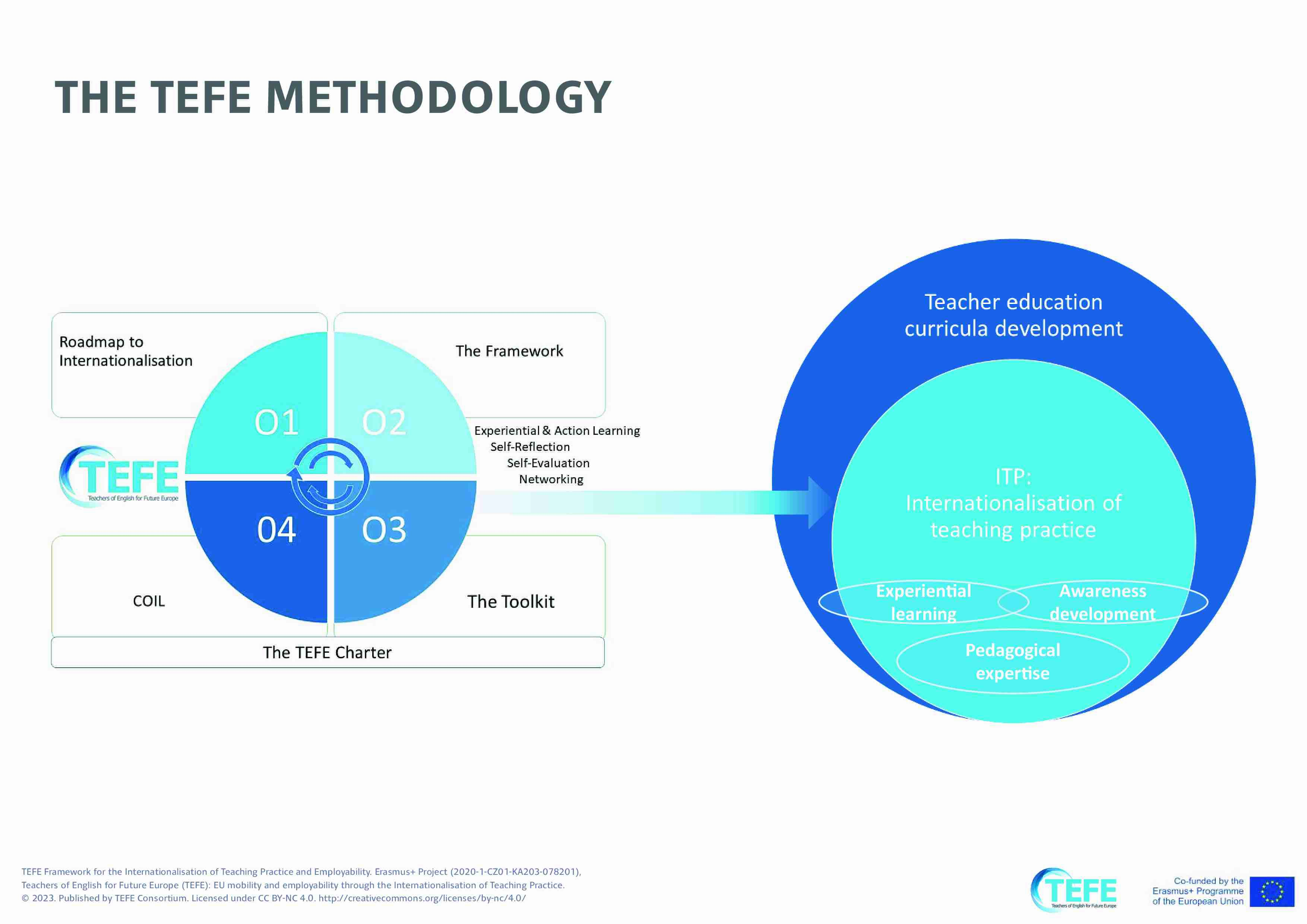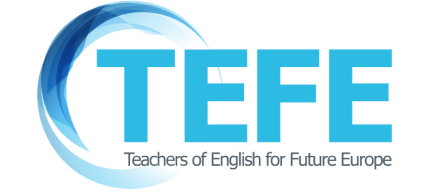TEFE Internationalisation of Teaching Practice (TEFE ITP), is an integral part of the broader TEFE Framework for Internationalisation of Teaching Practice and Employability. This guide aims to stimulate educators, teacher mentors, and student teachers, fostering a mindset embracing internationalisation as a fundamental aspect of teacher education within the TEFE Consortium. The TEFE ITP provides key orientations, opportunities, and challenges associated with internationalisation in teacher education.
The TEFE Roadmap for the Internationalisation of Teaching Practice (TEFE Roadmap), is an integral part of Output 1 – TEFE Internationalisation of Teaching Practice. It is conceptualised as a strategic and practical resource tailored for teacher educators and higher education institutions. The roadmap facilitates the implementation of internationalisation as a continuous process, offering two distinct starting points: one for university and faculty management and administration, and the other for student teachers. While not every step may be necessary for every implementation, the roadmap ensures a convergence of perspectives from the institution’s “above” and the student teachers’ “below.”

The TEFE Framework for the Internationalisation of Teaching Practice and Employability plays a pivotal role within the comprehensive TEFE Framework for ITP. Its core objective is to equip prospective English teachers with essential international employability competences, enabling them to excel in International Teaching Practice both within the Consortium partner institutions and on a wider international scale. The TEFE Framework defines the employability competences necessary for successful ITP, presents pedagogical tools, identifies skills gaps, and outlines a conceptual model for their development. Building upon the structure of Output 1, TEFE Internationalisation of Teaching Practice, Output 2 underscores the need to cultivate the international perspective in developing the employability, mobility, and professional identity of future teachers of English to ensure their enduring success in the teaching profession.

The TEFE Conceptual Model: Nurturing the Growth of Employability Competences for Internationalisation visually represents the evolution of three integral employability competences in the TEFE framework: Intercultural Communicative Competence (ICC), Professional Teacher Competence for Internationalisation (PTCI), and Global Civic Competence (GCC). The model highlights the dynamic interconnectedness of these competences, guiding individuals and institutions in competency development within English language education. Key features of the TEFE Conceptual Model include the interplay of competences, personalised entry based on prior experience, a spiralling growth trajectory, influencers of development, and the pivotal role of internationalisation. In summary, this model encapsulates TEFE’s approach to holistic competence growth, acknowledging the uniqueness of each learner’s journey and fostering teaching excellence.
 The TEFE Methodology visually encapsulates the methodology introduced in Output 2. It illustrates the interconnectedness of the TEFE project’s four key outputs and underscores the significance of institutional commitment to internationalisation. The TEFE Methodology is designed to enhance graduate employability by equipping future English teachers with the skills necessary for international employment. It fosters experiential and reflective learning, focusing on human and social capital development, individual behaviours, and attributes. As a comprehensive guide for educational institutions, it empowers student teachers to excel in diverse language education settings.
The TEFE Methodology visually encapsulates the methodology introduced in Output 2. It illustrates the interconnectedness of the TEFE project’s four key outputs and underscores the significance of institutional commitment to internationalisation. The TEFE Methodology is designed to enhance graduate employability by equipping future English teachers with the skills necessary for international employment. It fosters experiential and reflective learning, focusing on human and social capital development, individual behaviours, and attributes. As a comprehensive guide for educational institutions, it empowers student teachers to excel in diverse language education settings.
The TEFE Toolkit of Diagnostic and Evaluation Tools offers a research-informed portfolio of resources designed to support the goals of Outputs 1 and 2. At the heart of the toolkit’s development is the emphasis on fostering critical reflective teaching practice, as previous research has demonstrated its importance for professional growth and pedagogical development. These skills are fundamental for all teachers, regardless of their experience levels. The toolkit equips TEFE Consortium members to effectively guide student teachers through ITP preparation and evaluation, enhancing the quality and effectiveness of teacher education. It includes various components, such as ITP planning resources, tools to enhance employability awareness, and self-learning materials. The TEFE toolkit complements a multitude of resources created and piloted during the project and provides opportunities for self-reflection by pre-service teachers and Newly Qualified Teachers (NQTs), aligning with the TEFE Framework for the Internationalisation of Teaching Practice and Employability.
The Classroom Observation Tool is a novel and specialised resource developed within the TEFE project. This tool offers a distinct approach to classroom observation, tailored to International Teaching Practice (ITP) contexts. The Classroom Observation Tool extends beyond conventional interactions, fostering reflection within and beyond the classroom. It prompts consideration of diverse interactional phenomena, including power dynamics and cultural identity. The Classroom Observation Tool aims to stimulate critical reflective teaching practices, effectively connecting classroom dynamics with the development of transferable employability skills. To achieve this, it draws upon cultural theory and focuses on four key dimensions: norms of classroom interaction, hierarchy and power, communication with various stakeholders, and managing the unexpected. In conjunction with observation prompts, the tool offers a reflection form for post-observation discussions, contributing to the holistic development of future educators’ professional skills.
The Classroom Observation Form, a critical tool for monitoring and assessing teaching interactions, is divided into four sections (A, B, C, and D). Each section focuses on a distinct aspect: A addresses classroom and social interaction norms, B explores hierarchy and power dynamics, C emphasizes effective communication, and D fosters self and cultural awareness. These key foci, guided by cultural theory, provide valuable insights into classroom dynamics, enabling observers to assess transferable skills and professional teacher knowledge. After observation, a reflection form is completed to encourage discussion and analysis. The form was refined and piloted during the project’s Intensive Study Programmes, ensuring its effectiveness. See Appendix 1 for the final version of the observation criteria.
The Teaching Practice Resource Pack for Internationalisation contains a set of Tasks that were designed by the O3 output team following the production and internal publication of the TEFE Framework.
Each Task listed below corresponds to one of three competences: Intercultural Communicative Competence (ICC), Professional Teacher Competence for Internationalisation (PTCI), or Global Civic competence (GCC). It should be noted that there are crossovers between and among these competences.
Each Task is suitable for self-evaluation. Some of the Tasks refer to either group interaction or group reflection, or both. It is recommended that where possible, group work should be adopted, particularly in teacher education programmes.
The TEFE Case Studies, gleaned over the three years in five European countries (Czechia, Germany, Poland, Slovakia, and Spain), encapsulate the diverse perspectives and experiences of student teachers, teacher mentors, and newly qualified teachers (NQTs). These stories offer real-world insights and lessons in teacher education, serving as tangible evidence of the positive impact of the internationalisation activities on young teachers of English in general and the influence of TEFE specifically.
The TEFE Glossary, developed over the three-year TEFE project through consultation and discussion of key ITP concepts, serves as a fundamental reference. Its primary objective is to provide accurate definitions and explanations, fostering a shared understanding of essential concepts related to international teaching practice (ITP) within the TEFE project. This resource plays an important role in harmonising terminology and promoting clarity, supporting the project’s goals for ITP and employability competences.
The TEFE Charter provides a means for institutions outside the TEFE Consortium to join the growing network of teacher education institutions committed to promoting and facilitating the internationalisation of teaching practice, teacher mobility, and employability within the EU, while creating positive and intercultural learning environments for future English teachers. The Charter is a voluntary, public expression of intent to join the TEFE Consortium and actively support and adhere to the TEFE vision and embrace the TEFE Framework for the Internationalisation of Teaching Practice and Employability.
Become a TEFE Charter institution to champion the TEFE vision of enhancing teacher status, professionalism, and international education across the EU and beyond.
